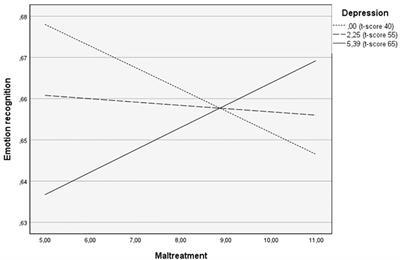Parental Depression Moderates the Relationship Between Childhood Maltreatment and Emotion Recognition in Children's Faces
Background: Sensitivity plays a crucial role in parenting as it involves the ability to perceive and respond appropriately to children's signals.

Childhood maltreatment and depression can negatively impact adults' ability to recognize emotions, but it is unclear which of these factors has a greater impact or how they interact. This knowledge is central to developing efficient, targeted interventions. This paper examines the interaction between parents' depressive symptoms and childhood maltreatment and its influence on their ability to recognize the five basic emotions (happiness, anger, sadness, fear, and disgust) in children's faces. Method: The sample consisted of 52 parents. Depressive symptoms were measured by the depression subscale of the Brief Symptom Inventory-18 (BSI-18), and maltreatment history was assessed by the Childhood Trauma Questionnaire (CTQ). Children's emotional stimuli were morphed images created using The Child Affective Facial Expression (CAFE) database. Results: Our findings indicate that depressive symptoms moderate the relationship between parents' history of childhood maltreatment and emotion recognition skills. Parents with higher depressive symptoms had lower emotion recognition accuracy when they had not experienced maltreatment. When childhood maltreatment was severe, emotion recognition skills were more consistent across all levels of depression.
The relationship between depression and emotion recognition was primarily linked to recognizing sadness in children's faces. Conclusions: These findings highlight how different experiences can affect parental abilities in emotion recognition and emphasize the need for interventions tailored to individual profiles to improve their effectiveness.
Read the full article at the original website
References:
